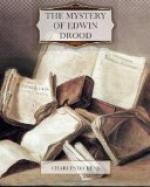That was a curious look of Rosa’s when they parted at the gate. Did it mean that she saw below the surface of his thoughts, and down into their twilight depths? Scarcely that, for it was a look of astonished and keen inquiry. He decides that he cannot understand it, though it was remarkably expressive.
As he only waits for Mr. Grewgious now, and will depart immediately after having seen him, he takes a sauntering leave of the ancient city and its neighbourhood. He recalls the time when Rosa and he walked here or there, mere children, full of the dignity of being engaged. Poor children! he thinks, with a pitying sadness.
Finding that his watch has stopped, he turns into the jeweller’s shop, to have it wound and set. The jeweller is knowing on the subject of a bracelet, which he begs leave to submit, in a general and quite aimless way. It would suit (he considers) a young bride, to perfection; especially if of a rather diminutive style of beauty. Finding the bracelet but coldly looked at, the jeweller invites attention to a tray of rings for gentlemen; here is a style of ring, now, he remarks—a very chaste signet—which gentlemen are much given to purchasing, when changing their condition. A ring of a very responsible appearance. With the date of their wedding-day engraved inside, several gentlemen have preferred it to any other kind of memento.
The rings are as coldly viewed as the bracelet. Edwin tells the tempter that he wears no jewellery but his watch and chain, which were his father’s; and his shirt-pin.
‘That I was aware of,’ is the jeweller’s reply, ’for Mr. Jasper dropped in for a watch-glass the other day, and, in fact, I showed these articles to him, remarking that if he should wish to make a present to a gentleman relative, on any particular occasion—But he said with a smile that he had an inventory in his mind of all the jewellery his gentleman relative ever wore; namely, his watch and chain, and his shirt-pin.’ Still (the jeweller considers) that might not apply to all times, though applying to the present time. ’Twenty minutes past two, Mr. Drood, I set your watch at. Let me recommend you not to let it run down, sir.’
Edwin takes his watch, puts it on, and goes out, thinking: ’Dear old Jack! If I were to make an extra crease in my neckcloth, he would think it worth noticing!’
He strolls about and about, to pass the time until the dinner-hour. It somehow happens that Cloisterham seems reproachful to him to-day; has fault to find with him, as if he had not used it well; but is far more pensive with him than angry. His wonted carelessness is replaced by a wistful looking at, and dwelling upon, all the old landmarks. He will soon be far away, and may never see them again, he thinks. Poor youth! Poor youth!
As dusk draws on, he paces the Monks’ Vineyard. He has walked to and fro, full half an hour by the Cathedral chimes, and it has closed in dark, before he becomes quite aware of a woman crouching on the ground near a wicket gate in a corner. The gate commands a cross bye-path, little used in the gloaming; and the figure must have been there all the time, though he has but gradually and lately made it out.




